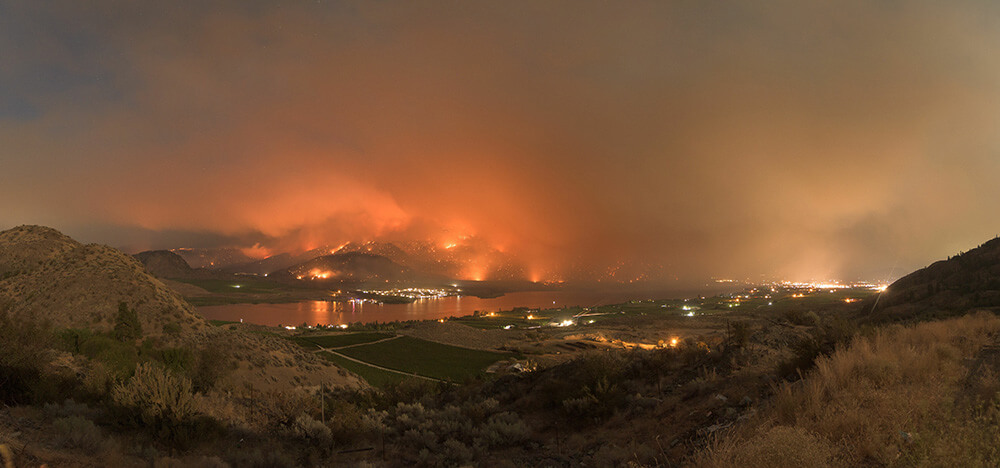
A wildfire rages near Osoyoos Lake in British Columbia in 2023. A record 46 million acres burned across Canada during the 2023 fire season, affecting events of all kinds.
On April 16, 10 inches of rain fell in Dubai, the same day that journalist Sander Lutz arrived in the city to cover Token2049, one of two cryptocurrency conferences scheduled that week, drawing thousands of visitors to the city. Lutz got a “minor taste of the apocalypse,” he wrote in Decrypt Media, as flooding turned the streets into rivers, making them impassable by most vehicles and shutting down the trains that connect the airport to the rest of the city. Token2049 events were canceled on his arrival day because the conference exhibit hall was flooded. Blockchain Life 2024, scheduled to start on April 17, delayed its opening. Meanwhile, conference attendees posted accounts of hours-long waits for airport taxis.
Event organizers always have had to factor in weather when they plan events, but Dubai’s record-breaking downpour on April 16 was more than just another rainy day. Scientists at World Weather Attribution — an academic collaboration that calculates the impact of climate change on extreme meteorological events such as heat waves, storms, and droughts — determined that storms that hit the UAE in April, including Dubai, were amplified by the rise in the average surface temperature of the Earth.

“It’s putting a lot of pressure on the organizers to make high-stakes decisions.” — Shawna McKinley
As the planet warms, “record-breaking heat waves on land and in the ocean, drenching rains, severe floods, years-long droughts, extreme wildfires, and widespread flooding during hurricanes are all becoming more frequent and more intense,” according to NASA scientists writing on the U.S. agency’s website. “All the risks from these extreme weather events will escalate the more the planet warms.”
Those risks are becoming real for event organizers, in Canada and elsewhere, said event sustainability expert Shawna McKinley, principal at Clear Current Consulting in Vancouver, Canada, who is tracking extreme weather and its impact on events. In addition to consulting for clients including TED and the Canadian Medical Association, McKinley has taught a class about sustainable event management operations at the British Columbia Institute of Technology (BCIT) for the last decade. She initially began building a database filled with case studies of events disrupted by extreme weather for class discussion, and as students have asked deeper questions about how climate change affects events and what to expect in the future, McKinley’s data collection and analysis has grown more extensive, she told Convene.
Last year, in an effort to give her students a greater sense of the scope and scale of extreme weather’s impact on events and how it could impact the future, McKinley decided to conduct an in-depth analysis of events in Canada that were disrupted by extreme weather in 2023. Her research asked two questions, McKinley wrote in the report “Extreme Weather and Event Planning Risks in Canada,” published in May: “How are events being affected by unusual and severe weather in Canada and how are event organizers responding?”
A Historic Year of Weather Disruptions
By monitoring both weather and media reports, McKinley found and recorded 72 events in 2023 that were canceled or partially canceled, relocated, postponed, or otherwise “impacted in a notable way” by the extreme weather. The kinds of weather that emerged in the data included heat waves, as well as unseasonably high temperatures that impacted winter events; storms; flooding; fire and smoke from wildfires; and extreme cold.
In 2023, Canada’s fire season was the most destructive ever recorded — nearly 46 million acres burned, “a staggering record” compared to a typical year when 6 million acres are lost to fire, resulting in travel bans and evacuation orders in some parts of the country, McKinley wrote in the report. Of the 72 events affected by extreme weather in her analysis, 52 were attributed to fire or smoke from wildfires — events disrupted by storms (nine events) and heat (six events) were a distant second and third, although some events had multiple weather-related causes, such as both heat and smoke.
Most of the disrupted events were outdoor special events (32 percent), sporting events (29 percent), and festivals (25 percent). There was only one weather-disrupted business event recorded in the report, but that should not be taken as evidence that business events are less impacted by extreme weather than other events, McKinley said. The kinds of extreme weather experienced, as well as the location and timing of events have an impact on the data in any given year, she said. For example, Hurricane Fiona, which hit the Atlantic Coast of Canada in September 2022, resulted in 19 event disruptions, business events among them.
Business events make up 8 percent of the case studies in McKinley’s entire database, which includes unpublished data about events outside of Canada and isn’t comprehensive, she said. But of the 67 reports of business events disrupted by extreme weather between 2005-2024 that McKinley has collected, the vast majority — 96 percent — were disrupted by named storms or extreme rainfall. None of the disruptions were caused directly by extreme heat, McKinley noted, but “heat as ‘global warming’ has been verified to contribute to the intensity of many storms and floods that have been the primary cause of business event disruption.”

Canada isn’t the only part of the globe feeling the heat of climate change. The Paris Olympics, which begin in late July, could be the hottest Games in history.
Greater Losses, Greater Uncertainty
In addition to collecting quantitative data about where and why events were disrupted, McKinley’s research included interviews with 19 of the affected event organizers about risk and emergency management, the financial impact of the disruptions, decision-making, and other topics.
“Most of the organizers who were interviewed feel that risks from weather are increasing in frequency and causing greater losses,” McKinley wrote in a summary of the research that she posted on LinkedIn. They also agree “that the operating environment for events has become more uncertain, due, at least in part, to weather incidents.”
All of the organizers who were interviewed had emergency response procedures in place that enabled them to react to weather incidents, and several said the pandemic had helped them to be better prepared. But with the incidence of smoke- and heat-related disruptions rising, decision-making has gotten more complex, McKinley said. “When there’s a travel ban, it’s really clear that the event is being called off,” she said. Organizers reported more anxiety, understandably, around the need to make decisions to cancel when their events experienced air-quality warnings or alerts but weren’t subject to mandatory weather orders or travel bans. “It’s putting a lot of pressure on the organizers to make high-stakes decisions,” McKinley said, “and it’s happening — in Canada anyway — year after year after year.”
All of the event organizers faced financial losses. A few were able to roll over supplier deposits and keep materials for future events, but several faced significant cancellation penalties and losses related to food and wasted event supplies. Only one of the 19 interviewees had insurance that covered losses, McKinley said. Insurance coverage for fire and smoke disruptions — which was what most of the event organizers faced in 2023 — was either not available to the organizers or the premiums and deductibles were so high that insurance was cost-prohibitive, she said. In response, some the event organizers were changing how they selected destinations to take the impact of extreme weather into account, and others had decided to shift the timing of their events to avoid weather risks, she wrote in the report.
Other event organizers had decided to take a breather. Nimble Fingers, a two-decades-old music workshop and festival held annually in Sorrento, British Columbia, announced that the festival would be taking a break in 2024. “The past few years have brought unprecedented challenges, including the impacts of the pandemic and wildfires, which have profoundly affected our ability to produce a safe and enjoyable event,” the organizers wrote in a statement. “With three of the last four years
cancelled due to circumstances outside of our control, we need a year to recover and regroup.”
For some events, weather-related cancellations took away opportunities that may not come again. The annual Canadian Table Tennis Championship had been scheduled to take place in 2023 in Hay River, a town of 3,800 people in Canada’s Northwest Territories and the homeland of the Dene Indigenous people, until wildfires forced a month-long evacuation of the town and the cancellation of the event. Organizers had planned a festival that would include Dene games, blending modern and Indigenous culture. Host destination Hay River lost out on the revenues hostingthe event would have generated, and something deeper: The loss of community growth and opportunity to host a national event, which “is possibly more acutely felt than the economic cost,” McKinley’s report said.
“That event was not just about sport, it was about culture exchange and economic benefit to remote communities,” McKinley said. “And that to me just really hits home — the personal stories of these situations.” As much as there’s financial strife, “what every organizer expressed is real despair about not living up to the potential of what they were wanting to deliver.”
Her research also caused her to reflect on the gatherings and community events that she missed during the pandemic, she said, and to consider “what if I never could go to any of these events again because I can’t travel or because they’re disrupted by weather? Or because they’re no longer financially tenable because the insurance rates are too high?
“Having gone through the COVID-19 pandemic and seen how damaging it was to the event sector and what we do, I feel like it is an extreme dress rehearsal for the slower impact that climate change will have on us if we don’t do anything about it,” McKinley said. “It’s given me a sense of what is at stake.”
Barbara Palmer is deputy editor of Convene.
On the Web
Find the report “Extreme Weather and Event Planning Risks in Canada.”

